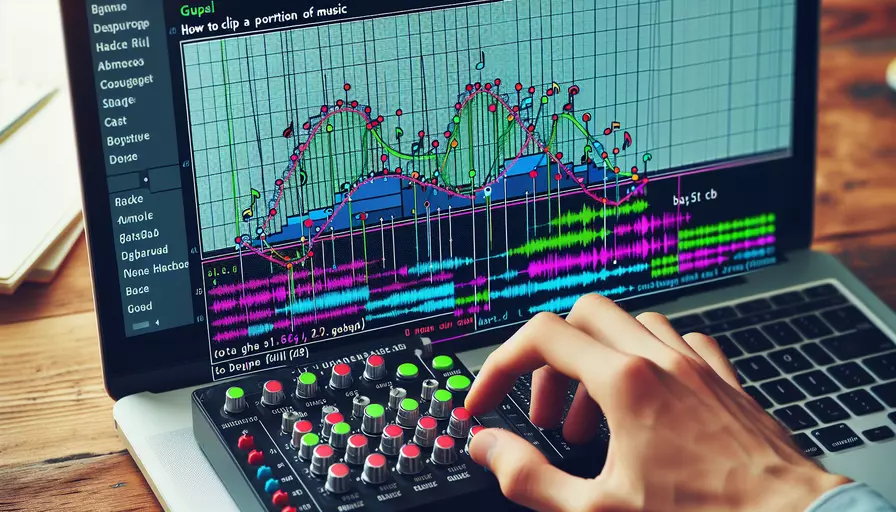
在Vue中截取部分音乐的方法主要有以下几个步骤:1、获取音频文件并加载,2、创建音频上下文,3、使用AudioBuffer和AudioBufferSourceNode进行截取,4、将截取的部分播放或保存。这些步骤可以帮助你在Vue应用中实现对音乐文件的部分截取。
一、获取音频文件并加载
要截取音乐文件的部分内容,首先需要获取并加载音频文件。你可以使用HTML5的<input type="file">元素来选择音频文件,并使用FileReader API读取文件内容。
<input type="file" @change="loadAudio">
methods: {
loadAudio(event) {
const file = event.target.files[0];
const reader = new FileReader();
reader.onload = (e) => {
this.audioData = e.target.result;
this.createAudioContext();
};
reader.readAsArrayBuffer(file);
}
}
二、创建音频上下文
创建一个AudioContext对象,用于处理音频数据。然后,使用AudioContext.decodeAudioData方法将加载的音频数据解码为AudioBuffer对象。
data() {
return {
audioContext: null,
audioBuffer: null,
audioData: null
};
},
methods: {
createAudioContext() {
this.audioContext = new (window.AudioContext || window.webkitAudioContext)();
this.audioContext.decodeAudioData(this.audioData, (buffer) => {
this.audioBuffer = buffer;
});
}
}
三、使用AudioBuffer和AudioBufferSourceNode进行截取
要截取音频文件的一部分,需要确定截取的开始时间和结束时间,然后使用AudioBufferSourceNode对象来播放截取的部分。
methods: {
playSegment(startTime, endTime) {
if (!this.audioBuffer) return;
const source = this.audioContext.createBufferSource();
source.buffer = this.audioBuffer;
const duration = endTime - startTime;
source.start(this.audioContext.currentTime, startTime, duration);
source.connect(this.audioContext.destination);
}
}
<button @click="playSegment(10, 20)">Play Segment</button>
四、保存截取的音频片段
如果需要将截取的音频片段保存为新的文件,可以使用Web Audio API的OfflineAudioContext来渲染音频数据,并将其导出为Blob对象。
methods: {
saveSegment(startTime, endTime) {
if (!this.audioBuffer) return;
const duration = endTime - startTime;
const offlineContext = new OfflineAudioContext(
this.audioBuffer.numberOfChannels,
duration * this.audioBuffer.sampleRate,
this.audioBuffer.sampleRate
);
const source = offlineContext.createBufferSource();
source.buffer = this.audioBuffer;
source.start(0, startTime, duration);
source.connect(offlineContext.destination);
offlineContext.startRendering().then((renderedBuffer) => {
offlineContext.decodeAudioData(renderedBuffer, (buffer) => {
const wavBlob = this.bufferToWave(buffer);
this.downloadBlob(wavBlob, 'segment.wav');
});
});
},
bufferToWave(abuffer) {
const numOfChan = abuffer.numberOfChannels,
length = abuffer.length * numOfChan * 2 + 44,
buffer = new ArrayBuffer(length),
view = new DataView(buffer),
channels = [],
i, sample,
offset = 0,
pos = 0;
// write WAVE header
setUint32(0x46464952); // "RIFF"
setUint32(length - 8); // file length - 8
setUint32(0x45564157); // "WAVE"
setUint32(0x20746d66); // "fmt " chunk
setUint32(16); // length = 16
setUint16(1); // PCM (uncompressed)
setUint16(numOfChan);
setUint32(abuffer.sampleRate);
setUint32(abuffer.sampleRate * 2 * numOfChan); // avg. bytes/sec
setUint16(numOfChan * 2); // block-align
setUint16(16); // 16-bit (hardcoded in this demo)
setUint32(0x61746164); // "data" - chunk
setUint32(length - pos - 4); // chunk length
// write interleaved data
for (i = 0; i < abuffer.numberOfChannels; i++)
channels.push(abuffer.getChannelData(i));
while (pos < length) {
for (i = 0; i < numOfChan; i++) {
sample = Math.max(-1, Math.min(1, channels[i][offset])); // clamp
sample = (sample < 0 ? sample * 0x8000 : sample * 0x7FFF) | 0; // scale to 16-bit signed int
view.setInt16(pos, sample, true); // write 16-bit sample
pos += 2;
}
offset++; // next source sample
}
function setUint16(data) {
view.setUint16(pos, data, true);
pos += 2;
}
function setUint32(data) {
view.setUint32(pos, data, true);
pos += 4;
}
return buffer;
},
downloadBlob(blob, filename) {
const url = URL.createObjectURL(blob);
const a = document.createElement('a');
a.href = url;
a.download = filename;
a.click();
URL.revokeObjectURL(url);
}
}
<button @click="saveSegment(10, 20)">Save Segment</button>
五、总结与建议
通过上述步骤,你可以在Vue应用中实现对音频文件的部分截取、播放和保存。总结主要步骤如下:1、获取音频文件并加载,2、创建音频上下文,3、使用AudioBuffer和AudioBufferSourceNode进行截取,4、保存截取的音频片段。建议在实际应用中,考虑用户界面的友好性和操作的简便性,可能需要增加错误处理和用户提示信息。此外,可以进一步优化截取和保存过程的性能,以应对更大规模的音频文件。
相关问答FAQs:
1. Vue中如何实现音乐截取功能?
要在Vue中实现音乐截取功能,你可以使用HTML5的Audio API来处理音频文件。下面是一个简单的示例:
首先,在Vue组件中定义一个Audio对象:
data() {
return {
audio: null,
currentTime: 0,
duration: 0
}
},
mounted() {
this.audio = new Audio('path/to/music.mp3');
this.audio.addEventListener('timeupdate', this.updateTime);
this.audio.addEventListener('loadedmetadata', this.setDuration);
},
methods: {
updateTime() {
this.currentTime = this.audio.currentTime;
},
setDuration() {
this.duration = this.audio.duration;
},
play() {
this.audio.play();
},
pause() {
this.audio.pause();
},
seekTo(time) {
this.audio.currentTime = time;
},
trim(start, end) {
const audioContext = new AudioContext();
const source = audioContext.createMediaElementSource(this.audio);
const destination = audioContext.createMediaStreamDestination();
const mediaRecorder = new MediaRecorder(destination.stream);
source.connect(destination);
this.seekTo(start);
mediaRecorder.start();
this.seekTo(end);
mediaRecorder.stop();
mediaRecorder.ondataavailable = (event) => {
const blob = event.data;
const url = URL.createObjectURL(blob);
const downloadLink = document.createElement('a');
downloadLink.href = url;
downloadLink.download = 'trimmed_music.mp3';
downloadLink.click();
};
}
}
然后,在Vue模板中使用这些方法和数据来控制音乐的播放和截取:
<div>
<button @click="play">播放</button>
<button @click="pause">暂停</button>
<input type="range" v-model="currentTime" :max="duration" step="0.1" @input="seekTo(currentTime)">
<button @click="trim(10, 20)">截取音乐</button>
</div>
在这个示例中,我们使用了currentTime来显示当前播放的时间,duration来显示音乐的总时长。seekTo方法用于跳转到指定时间的位置,trim方法用于截取音乐的一部分并下载。
2. 如何在Vue中实现音乐截取后的播放?
要在Vue中实现截取后的音乐播放功能,你可以使用HTML5的Audio API和MediaRecorder API来处理音频文件。
首先,你需要在Vue组件中定义一个Audio对象和一个MediaRecorder对象:
data() {
return {
audio: null,
mediaRecorder: null,
currentTime: 0,
duration: 0
}
},
mounted() {
this.audio = new Audio('path/to/music.mp3');
this.audio.addEventListener('timeupdate', this.updateTime);
this.audio.addEventListener('loadedmetadata', this.setDuration);
},
methods: {
updateTime() {
this.currentTime = this.audio.currentTime;
},
setDuration() {
this.duration = this.audio.duration;
},
play() {
this.audio.play();
},
pause() {
this.audio.pause();
},
seekTo(time) {
this.audio.currentTime = time;
},
trim(start, end) {
const audioContext = new AudioContext();
const source = audioContext.createMediaElementSource(this.audio);
const destination = audioContext.createMediaStreamDestination();
this.mediaRecorder = new MediaRecorder(destination.stream);
source.connect(destination);
this.seekTo(start);
this.mediaRecorder.start();
this.seekTo(end);
this.mediaRecorder.stop();
this.mediaRecorder.ondataavailable = (event) => {
const blob = event.data;
const url = URL.createObjectURL(blob);
this.audio.src = url;
this.play();
};
}
}
然后,在Vue模板中使用这些方法和数据来控制音乐的播放和截取:
<div>
<button @click="play">播放</button>
<button @click="pause">暂停</button>
<input type="range" v-model="currentTime" :max="duration" step="0.1" @input="seekTo(currentTime)">
<button @click="trim(10, 20)">截取音乐并播放</button>
</div>
在这个示例中,当你点击"截取音乐并播放"按钮时,音乐将会被截取并重新加载到Audio对象中,并开始播放截取后的音乐。
3. 如何在Vue中实现音乐截取后的保存?
要在Vue中实现截取后的音乐保存功能,你可以使用HTML5的Audio API和MediaRecorder API来处理音频文件。
首先,你需要在Vue组件中定义一个Audio对象和一个MediaRecorder对象:
data() {
return {
audio: null,
mediaRecorder: null,
currentTime: 0,
duration: 0
}
},
mounted() {
this.audio = new Audio('path/to/music.mp3');
this.audio.addEventListener('timeupdate', this.updateTime);
this.audio.addEventListener('loadedmetadata', this.setDuration);
},
methods: {
updateTime() {
this.currentTime = this.audio.currentTime;
},
setDuration() {
this.duration = this.audio.duration;
},
play() {
this.audio.play();
},
pause() {
this.audio.pause();
},
seekTo(time) {
this.audio.currentTime = time;
},
trim(start, end) {
const audioContext = new AudioContext();
const source = audioContext.createMediaElementSource(this.audio);
const destination = audioContext.createMediaStreamDestination();
this.mediaRecorder = new MediaRecorder(destination.stream);
source.connect(destination);
this.seekTo(start);
this.mediaRecorder.start();
this.seekTo(end);
this.mediaRecorder.stop();
this.mediaRecorder.ondataavailable = (event) => {
const blob = event.data;
const url = URL.createObjectURL(blob);
const downloadLink = document.createElement('a');
downloadLink.href = url;
downloadLink.download = 'trimmed_music.mp3';
downloadLink.click();
};
}
}
然后,在Vue模板中使用这些方法和数据来控制音乐的播放和截取:
<div>
<button @click="play">播放</button>
<button @click="pause">暂停</button>
<input type="range" v-model="currentTime" :max="duration" step="0.1" @input="seekTo(currentTime)">
<button @click="trim(10, 20)">截取并保存音乐</button>
</div>
在这个示例中,当你点击"截取并保存音乐"按钮时,音乐将会被截取并保存为一个新的音频文件,并自动下载到本地。
文章标题:vue如何截取部分音乐,发布者:飞飞,转载请注明出处:https://worktile.com/kb/p/3632944

 微信扫一扫
微信扫一扫  支付宝扫一扫
支付宝扫一扫 